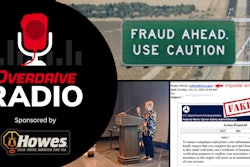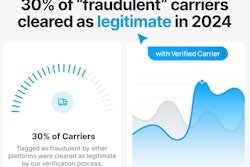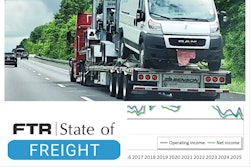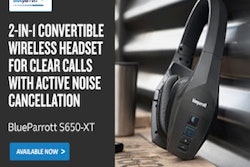In the ever-shifting "carrier vetting" landscape, owner-operators sometimes find themselves buried in paperwork just to get onboarded with a broker they've already hauled for.
That's what two owner-ops told Overdrive about a handful of big brokers using Highway, a Dallas-based carrier vetting and onboarding platform with some data requirements these carriers found "over the line."
Both owner-operators Overdrive spoke to hauled using glider kit trucks, and paper logs. In the last few months, they reported some broker customers moving over from RMIS to Highway for their onboarding/monitoring provider, and in the process essentially locking them out of freight.
"I have a 2020 Freightliner with a '98 engine in it. I am not required by law to run an ELD," said Vee, an owner-operator with nearly 20 years of authority behind her. "Now brokers say they won't use me because of it. I'm losing thousands of dollars, loads and loads, and some of these brokers I've been set up with before."
Vee has seen brokers blacklist carriers before, so she declined to give her full name fearing retaliation. Vee said Axle Logistics and Buchanan Logistics stood among the brokers she'd worked with before that have turned to Highway. With the way things have gotten, she felt she had to say something.

When she tries to onboard with a broker through Highway, they ask for her cab card, certificate of insurance, and a copy of the driver's license, she said. In some cases, they ask for the truck's VIN, a copy of the title, or a copy of loan payments on the truck.
Vee said she was "having a little meltdown behind the stupidity our society has come to," as she thinks that's her vital information that could be used to impersonate her if it fell into the wrong hands. "That’s overstepping -- that’s none of their business," she said.
[Related: Hacked? How to contain the damage, or better avoid the hackers entirely]
Worse, said Vee, when she calls into Highway, she's connected to overseas call centers that she feels don't sufficiently understand her concern.
A Highway spokesperson responded to Overdrive's request for comment on Vee's experience. Highway employs "team members in offices all over the world to be able to provide 24/7/365 support to carriers and brokers," including a "dedicated team based in the Philippines who provides overnight support," the spokesperson said, adding that Highway provides support in English, Spanish, and French, and carriers should let them know if they'd like to see other languages supported.
Highway, founded in 2021, "just popped out of nowhere and started putting people out of business," said Vee, citing the administrative asks of onboarding through them. The people at Highway might counter that the company has been fighting fraud, but for Vee, a non-fraudulent, real carrier having to contend with their process, that doesn't really move the needle.
All that paperwork only covers a single load, too, noted a second owner-operator, whom we'll call E (again fearing retaliation). After submitting a COI, cab card, driver's license, and potentially even more info, "sometimes you can get the load -- they’ll approve it -- and sometimes they don’t," she said. "I have given them all that information and still turned around and been refused."
Both owners said Highway credits the final load awards and paperwork checklists to the brokers themselves. Indeed, Highway doesn't really make hiring decisions, and just offers a broad menu of onboarding tasks to its broker customers.
"Highway’s mission is to connect more legitimate carriers with legitimate brokers," the spokesperson said. "We seek to direct more freight to active and running carriers and seek to protect networks from those who are impersonating real carriers. A big part of defining 'legitimacy' is the presence of active and insured vehicles belonging to the carrier. If a carrier has not met a broker’s requirements in terms of demonstrating the presence of active and insured vehicles, we provide a way for the carrier to connect their ELD to their Highway account."
Both owner-operators expressed frustration with a variety of "carrier vetting" services, and the Highway spokesperson suggested this process would be welcome news to many carriers erroneously flagged by other platforms like Carrier Assure or Carrier 411.
[Related: Carrier411's big changes to its 'FreightGuards' might open a legal can of worms]
"This process often helps carriers, especially smaller ones," said the Highway spokesperson. "For example, a small carrier without any inspections may have a hard time proving that they are running active vehicles and may be flagged across a number of onboarding providers. However, an ELD connection will prove that they have active operations, regardless of their inspection count."
Most carriers, however, won't have to go through the process Vee and E did. "A carrier is only prompted to provide this information if the broker (Highway's customer) allows ELD exemption claims in their onboarding process and the carrier indicates they have an ELD exemption," said Highway's spokesperson. "When a carrier makes this claim to the broker, the carrier is prompted to upload" a copy of the title or loan agreement, the cab card or registration and the driver’s license.
"These documents are included in a secure email sent directly to the broker for review and a hiring decision is adjudicated by the broker without input from Highway," the spokesperson continued. "Carriers are only asked for this information if they claim an ELD exemption and the broker has opted to review these claims."
The spokesperson directed carriers to contact [email protected] or visit the Highway Help Center.
But that's just where the breakdown in trust and communication happens. Both owners had access to Highway's support features and tools. Yet where Highway says it's a secure system that seeks to provide opportunity for growth, the two owner-operators took a dimmer view -- they just don't like all the paperwork, and fundamentally don't trust the company.
E, at times, calls that glider truck home, so the title and VIN number become a bit personal.
"How do I know someone isn't going to come take my truck away because they transferred the title because they have all the information?" said E. "That's my concern. I don’t mind giving them the last eight digits of my VIN, but not the whole number along with my driver's license, my picture, my address -- all of that going through the internet."
"Where do you think fraud starts?" asked Vee. Fraudsters take "all your information from the FMCSA" and impersonate the carrier on load boards. One key vector in such an attack is the certificate of insurance, which watchers advise carriers to hold close to the chest.
[Related: Safeguard your trucking business’ certificate of insurance to avoid becoming an ID theft victim]
"We understand that carriers have concerns about privacy and identity theft, which is why protecting sensitive information is our top priority," the Highway spokesperson said. "Highway employs industry-leading, bank-grade security that includes" independently-audited security measures up to snuff with the best security practices in the industry. "It's also important to note that Highway was specifically designed to prevent identity theft. By securely verifying carriers’ identities, we help protect them from bad actors and ensure that only legitimate carriers have access to freight opportunities."
Highway said it will "proactively notify you if we detect that your identity may have been compromised" and that its mission is "to safeguard not just your data but your reputation and business as well."
There's no real reason to doubt that Highway has every incentive to avoid a major hack or breach of confidence and duty by scamming carriers or letting information leak, yet the owners raise another point.
"You can’t tell me when [a state's Department of Motor Vehicles] has been hacked, when Verizon, Apple -- everyone has been hacked... What makes them think they can't be hacked?" asked Vee.
In Highway's accounting of their security practices, they do not claim they're un-hackable. Formerly "bullet proof" vests are now advertised as "bullet resistant." The Titanic did in fact sink, and God probably still has a good laugh when mice and men announce their long-term plans.
The owners' concerns go beyond simply Highway and toward the slow creep of surveillance technology in trucking. In some ways, the two are living the trucking dream -- owner-operator masters of their machines running on their know-how.
[Related: Trucking's State of Surveillance: Special report]
"The only technology I use is in my hand," said Vee, referencing her smartphone. "I'll do Macropoint, but as soon as I finish the load I delete the app and clean my phone."
Still, a broker might seek to ding you $50-$250 for not tracking a load, she said. Vee would rather simply share her Google location with the broker, as it's a free app. "I don’t need all that super-duper data transferring," she said. "I've come to the serious conclusion that the only reason why a percentage of [brokers] do that is to feel like they're worthy,"
After all, it's the carrier actually hauling the freight while the broker sits in an office.
Meanwhile, Vee and E both ask the same question: Where are the protections for carriers?
"I’m the one running into cost," said E. "I spent how much money on fuel, on taxes? And if I didn’t get paid where’s the protection for us? If I'm filing a claim on someone's $75,000 bond, that's only" enough to cover about 20 loads "until it's all dried up," said E.
FMCSA recently delayed provisions of a rule that might help those cases. Massive interpleader cases, meanwhile, swirling around collapsed brokerage Convoy's bond have some calling for an increase in bond amounts. E has been burned by shut-down brokers before, and would like to see some of the energy around "carrier vetting" turn towards "broker vetting."
[Related: Ikea sues Convoy over unpaid carriers]
Dale Prax, the purveyor of FreightValidate, does offer a broker-vetting product with reports on brokers' payment terms and credit ratings, also available through other services, but both carriers felt the industry's fight against fraud hadn't faced the right direction.
"I ran into a broker agent running three or four MC numbers out of one office," said Vee. "To me, that's more fraud than" carriers simply declining an ELD hookup.
Highway had quite a lot to say on that front. In fact, they at least partially seemed to agree.
"At Highway, we have stringent requirements that brokers must meet to become our customers, ensuring that carriers' information is handled responsibly," said the spokesperson. "We understand that fraud is a pervasive issue affecting all sides of the freight industry, and we are committed to addressing it proactively."
As part of that commitment "we’re thrilled to announce a new offering that is in beta testing: Highway for Carriers. This extension of Highway empowers carriers to verify and build secure connections with brokers," the spokesperson said.
"Carriers will have the opportunity to see important information on their broker partners, like their digital activity, credit approval, industry affiliations, size, authority and approved rate confirmation and invoicing contact information," the spokesperson said of the new Highway for Carriers product. "Carriers will also have the opportunity to report suspicious brokers and request that unknown brokers verify their identity."
For carriers interested in joining the beta launch of Highway for Carriers, email [email protected] "to gain early access and be part of shaping this exciting new tool," the spokesperson said. "We welcome your feedback!"
For now, seems owner-ops like Vee and E might not enthusiastically participate in reassure brokers, especially ones they're already onboarded with, that they're legit, but at least with Highway, Freight Validate and a new broker-vetting product upcoming from Carrier 411, it seems the industry has taken their "broker vetting" concerns to heart.
[Related: $10/month to vet yourself for a broker? Carrier vetting's latest turn]














